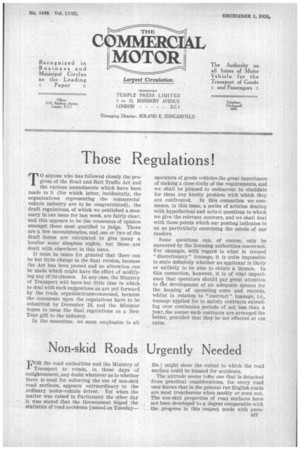Non-skid Roads Urgently Needed
Page 35

Page 36

If you've noticed an error in this article please click here to report it so we can fix it.
VOR the road authorities and the Ministry of Transport to retain, in these days of enlightenment, any doubt whatever as to whether there is need for enforcing the use of non-skid road surfaces, appears extraordinary to the ordinary motor-vehicle driver. Yet when the matter was raised in Parliament the other day it was stated that the Government hoped the statistics of road accidents [issued on Tuesday— ED.] might show the extent to which the road surface could be blamed for accidents.
The attitude seems totbe one that is detached from practical considerations, for every road user knows that in the general run English roads are most treacherous when muddy or even wet. The non-skid properties of road surfaces have not been developed to a degree comparable with the progress in this respect made with pnen matic tyres, so that the best of tyres will skid on almost any urban road that is muddy. Tyres have treads but roads bare not. Smooth roads like those in London, Coventry and almost every other town seem to have been designed to promote skidding.
Yet how many experienced drivers could answer in the affirmative if asked whether they have had an opportunity to make a conclusive test in bad weather on a treaded road—for instance, that with a cast-iron surface? Good half-mile stretches of such experimental surfaces ought to be laid on trunk roads, as, for example, that between London and Coventry, large notices should invite drivers' opinions (which could be sent in post free) and the opinions should be summarized and published.
An Unlooked-for Effect of the Basic-tonnage Year
INSTEAD of encouraging enterprise, the coinPutation of "claimed" tonnage on the maximum unladen weight of vehicles owned and used by an operator during a particular year will have the reverse effect. Owners of oldtype, heavy and, often, disreputable vehicles will benefit to an appreciably greater extent than those. enterprising operators who, previous to the year in question, put into service modern, Tight vehicles. By doing this they have, in many instances, cut down the total unladen tonnage for which the licences.will be granted without the difficulty and the overcoming of objections which will, no doubt, occur in connection with that class of tonnage referred to in the regulations as "discretionary." Apart from this, the 12 months selected covered a period during which the depression reached its almost acute stage; consequently, many vehicles were out of commission, and it is notable that the new legislation refers to " claimed" tonnage as that which was owned and used during this time, se that a vehicle which was in the possession of an operator but out of commission will be automatically discounted, which seems most unfair, because it still represented a portion of the capital of the owner.
The Cheapest Means for the Transport of Light Goods TT.AVING disgorged its heavy contents of -1-1three weeks ago, Olympia has now taken a smaller mouthful of lighter fry. Motorcycles, representing, according to the Minister of Transport, one of England's most prosperous export industries, comprise a large part of the present Exhibition in this famous building.
The three-wheeled parcelear, and the motorcycle and sidecar combination built for the transport of goods, are the cheapest means that exist for the rapid delivery of limited quantities of light articles. They have now been brought to a state of development that makes them easy to drive, safe, reliable, simple and cheap to maintain.
A number of examples of both classes is on view at the Exhibition, which remains open until 10 p.m. to-morrow, and such machines are well worth the consideration of those whose businesses are of natures for which these vehicles can appropriately be employed




































































































